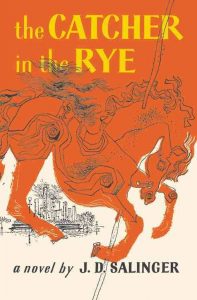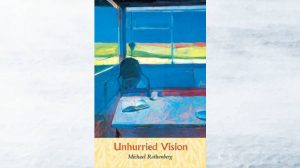
When I read this masterpiece as a teen, I thought Holden Caulfield was the coolest kid ever – a common reaction. A friend of mine even wore a deerstalker hat to high school, as the narrator does throughout much of his journey from prep school to New York. Holden’s rants about societal hypocrisies echo our own adolescent realizations that much of what we have been taught to believe as children is lies. “If you want to know the truth,” he says, “I can’t even stand ministers. The ones they’ve had at every school I’ve gone to, they all have these Holy Joe voices when they start giving their sermons. God, I hate that. I don’t see why they can’t talk in their natural voice. They sound so phony when they talk.” And so, Holden became one of my teen heroes, as he had for so many others.
Then I taught this book in a class consisting mostly of adult-aged women. Our reaction? “That poor boy!” Little Holden is so insecure, so scared, and so torn-up by the death of his brother that he acts out in all sorts of rebellious ways. His dangerous attitude is all a nervous front, a fact that becomes clearer with every tough-talking word. “I’ve had quite a few opportunities to lose my virginity and all, but I’ve never got around to it yet.” Sure you have, Holden. Sure you have. When he tells us, “I’m the most terrific liar you ever saw in your life,” we see through his front, and into the damage that makes him lie.
Does this mean Catcher in the Rye isn’t as good as I thought? Not at all! It is much better – a careful study of adolescent psychology and a perfect crystallization of our teenage truths. This book is a mirror that grows with us and reveals the things we have lost as well as who we have become.




Kyle says
Great review, Eric. CITR was my favorite book in high school and I’ve often considered reading it again for the same reasons you’ve expressed. Now I think I will.
Kyle
Jeff says
I think the truth lies somewhere in between the two views presented here. I actually sometimes think back to Holden and try to remember his views of “fakes.” I do this whenever I am becoming to be too fake. In doing this, of course, I’m contacting my own inner teen. Holden’s emotional reaction to all the fakekness of the world around him is overblown because he’s a kid, but that doesn’t mean what he’s seeing isn’t at least partially correct. To blow that off as just some teenage angst is a bit of an oversimplification, I think, and I don’t think it helps the many, many kids who still feel ths way and struggle with it.
The reason it’s so hard to reason with those kids is because in some ways they are right, but most adults have been living pretend lives for so long they can’t even see anymore how full of shit they are. and yes, I was one of those kids and yes, they sent me to guidance counselors, and yes, I thought those counselors were fake, narrow minded fools…and looking back, I STILL think that, but for much different reasons.
Holden is a mixed up kid but he’s no fool. Well, at least he’s not entirely a fool, only partially, but so too are those middle aged women reading the book and seeing him as nothing more than a lost kid who needs to get more involved in intramural sports and popularity clubs.
And for the record, I’ve learned to maneuver in this world with a decent amount of success socially and financially, but I still remember the way I thought as a kid, and I respect that kid, just like I respect Holden, because in many ways they were/are right.
“Growing up” to some degree, and I think a rather large degree, is really about shedding our individuality in order to absorb socially acceptable appearances. it is largely a big show. While it’s probably a necessary part of being human, it’s also something worthy examining personally in ourselves.
The world created by these middle ages women is largely just one designed to buffer their own insecurities, fears, and “fakeness.” I don’t think Holden’s perspective should be written off in such a way.
but, even if it should be ultimately written off completely by and for adults, the kids who feel that way have a lot more going on in their minds than “I need a hug.” That kind of harping nannyism will destroy kids who are trying to construct meaning in their lives and who will not take the easy answers that everybody else enjoys.
Anyway, interesting little article, I’m just adding my thoughts on the matter.